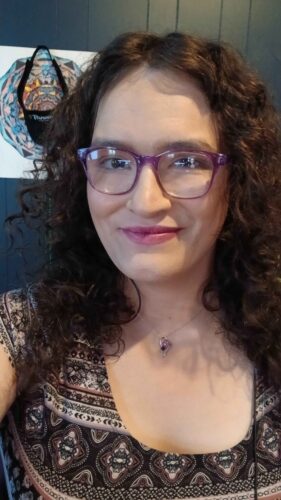For some students, choosing a Wikipedia article to improve can be a challenge, but for recent Rhode Island College graduate Samantha Cote, picking an article for her Wikipedia assignment was easy – and then the real work began!
“I entered the project with the understanding that the article I chose was likely to be a mishmash of various and, to a degree, biased, viewpoints that I would have to analyze and make sense of, due to the nature of the topic,” said Cote, who transformed the Association Shams Wikipedia article as part of her coursework. “Associations Shams is a nonprofit that focuses on LGBTQ rights and sexual health advocacy, and it exists in a country that criminalizes homosexuality.”
First, the political science student needed to untangle what felt like a jumble of biased, conflicting viewpoints she encountered in the existing text. Next, she had to find high-quality sources to enhance the accuracy, neutrality, and representation of the topic.

Already familiar with the Tunisian organization through her research for a previous course, Cote began her work by trying to identify issues, biases, and missing or redundant information in the article.
“I wanted to improve the quality of the article and clarify the viewpoint to a more neutral and informational one, rather than a fight between different editors to paint the organization one way or another,” explained Cote. “I was very insistent on adding academic sources, because all of the information in the [existing] Wikipedia article was sourced from news articles, which focused on sensationalism and controversy.”
Cote not only incorporated new content and sources into the Association Shams article, but she also transformed its structure, creating a more balanced and representative distribution of sections. Before Cote’s Wikipedia assignment, the online encyclopedia’s coverage of the nonprofit organization was dominated by information related to legal battles and controversies.
“I edited the controversy sections so that it was clearer to distinguish who or what was being critiqued specifically, and to sequester the information into the relevant sections, rather than spread out throughout the entire article,” said Cote. “I wanted to bring to the forefront how deeply connected the organization is to the Arab Spring movement and the increasing push towards secularism and democracy throughout the Arab world. The first academic source I found helped me add information about how the fight for democracy was the catalyst that inspired numerous people in Tunisia to fight for relevance and power, including the LGBTQ community.”
Though she experienced a bit of shaky confidence as a new Wikipedia editor, Cote underscored her appreciation for the assignment and the new skills she developed throughout the process.
“Despite the learning curve, this was one of the most interesting and engaging projects that I have ever done throughout my college years,” said Cote. “It was challenging, yet not overwhelming. Most of all, it taught me a lesson I’ll use going forward, more often than drafting an academic paper of any sort.”
One of Cote’s key takeaways? Information can be constructed in ways that present biases – and all of us have the power to contribute to a more accurate, representative, and complete information landscape.
“For a lot of young people, using Wikipedia to find a starting point is particularly important to the way that we explore and understand the world around us,” reflected Cote. “The abundance of articles and the ubiquity of Wikipedia contributes to an atmosphere of understanding, trust and consistency that feels less and less common these days. And now I have a Wikipedia account, experience, and the knowledge and confidence to make useful and worthwhile contributions.”
Interested in incorporating a Wikipedia assignment into your course? Visit teach.wikiedu.org to learn more about the free resources, digital tools, and staff support that Wiki Education offers to postsecondary instructors in the United States and Canada.
